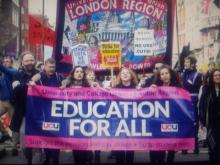Higher Education talks enter crucial stage
The University and College Union (UCU) is now in its third week of strike action over pensions, pay, equality issues, workload and casualization of the sector. Although developments are being kept pretty much in secret, branches have pressed the Union leadership for an open discussion and ratification of any agreements that we may collectively come to. Some branches have also been discussing what the next step could entail if there is insufficient progress. While the sector does not have a huge amount of power in some senses, unless railway unions or NHS workers, universities are increasingly concerned about their reputations in a competitive education “market”, especially when it comes to high fee payment international students and loss of income due to a lack of grant applications from governments, agencies and trusts.

